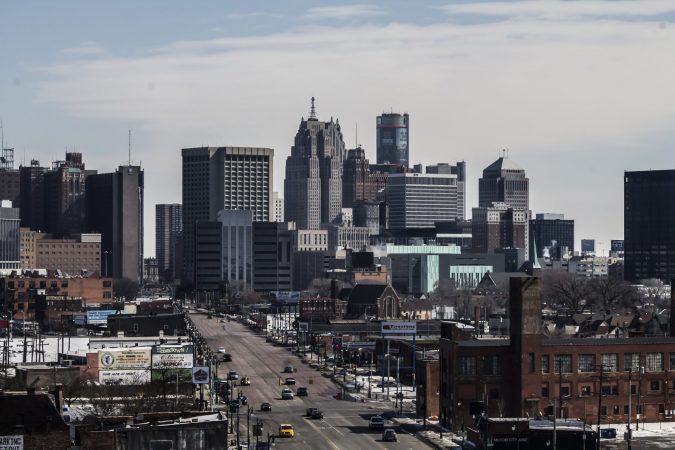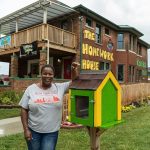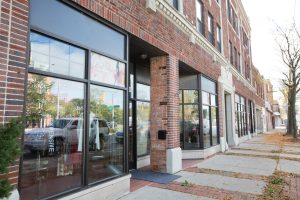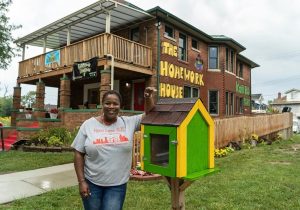With no end to the COVID-19 pandemic in sight as well as a looming economic crisis, the past few months have been tough for just about everyone and have certainly included the most vulnerable in Metro Detroit. Struggling as a homeless individual is hard enough without a global pandemic, but when shelters are forced to close or move to a mostly virtual setting, things get even harder for vulnerable families, veterans and individuals.
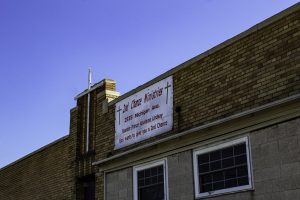
SECOND CHANCE MINISTRIES IN CORKTOWN. PHOTO JOHN BOZICK
Left without much other choice, shelters, organizations and nonprofits have adapted to help those most vulnerable and in need.
Operating on Michigan Avenue in Detroit’s Corktown neighborhood, Second Chance Ministries is a haven that provides a church service and a meal every Wednesday for those in need. In the wake of COVID-19, the center is operating to the best of its abilities, with PPE and sanitizer, as well as applying extra social distancing measures for its members.
Still, according to lead minister, Prince Kootama Lindsay, with the added stress of a global pandemic and further economic woes, the past few months have not been easy for many he has worked with.
“A lot of the folks that are homeless, they’re staying in shelters and the shelters are not allowing them to leave because of the virus. If they do leave, they can’t get back in and, when a person is locked up like that, it has a tendency to bring on depression,” shared Minister Lindsay, while discussing the impact the pandemic has had on the cities most vulnerable. “They already have a lot of stuff going on, so that [COVID-19] is just adding onto it.”
Lindsay also brought up that many who aren’t able to make into shelters have found themselves cut off from aid they received from good samaritans unable to continue their work amid the crisis.
“On the other side of things, you have homeless folks that are sleeping in the streets, the parks, or abandoned buildings,” he shared. “A lot of people used to come out and help these people just from off the street. People would pull up like at the NSL Detroit Rescue Mission downtown. Well, now you have people that stopped doing that because of COVID-19 and they’re afraid of catching the virus.”

A VOLUNTEERS OF AMERICA CENTER IN DETROIT. PHOTO JOHN BOZICK
FACING EVICTIONS
Another concern when looking at how the pandemic has impacted those most vulnerable in the Detroit area is the fear of evictions, especially among low-income families and those who are veterans. Before the pandemic, those in need of assistance had many in-person options, but in a situation where in-person operation remains dangerous for individual health, things have had to move online to a virtual format.
Operating virtually becomes a problem when those seeking assistance may not have a means of working through that medium, be they already homeless, or made homeless by the pandemic due to worsening economic conditions.
With PUA ended and many not knowing if they will be able to make their rent, an increase of evictions remains an impending possibility left with dire consequences. At Volunteers of America, a nonprofit organization working to provide housing and other assistance services to low-income people, they are remaining prepared and ready to assist those most vulnerable to the best of their abilities.
Laura LeBlanc, Vice President of Development and Communications for Volunteers of America, shares that while operations have moved mostly online, the center is working diligently with other nonprofits and partners across the region to ensure there is proper communication with those seeking assistance.
“The extensions on the state level for evictions are a big concern of ours and we’re concerned about whether that’ll cause an influx,” shared LeBlanc. “So, we’re making sure that those in need have access to and know to call us and know that we’re here. We’re really trying to utilize all of our community partners to make sure they know what services we offer that and that we’re continually talking with all of our partners.”
Another concern LeBlanc pointed out is that with Michigan Works offices being closed, it’s become harder for those seeking help to find their organization.
“With Michigan Works offices being closed, it is tough, that’s a big access point for families or veterans who don’t know we’re here and how they’re able to find us,” she shared. “So, we’re having to get very creative in ways we’ve never had to do before and life just looks a lot different for someone who’s homeless right now.”
Another aspect to take into account when looking at how the pandemic has impacted those most vulnerable is the family unit. When a family is facing financial hardship in Detroit, they can be referred to the Coalition On Temporary Shelter [COTS], a nonprofit that works to help families out of the cycle of poverty by helping to provide homes and assistance to those who need them.
Shifting most operations to an online medium, COTS has worked to provide shelter for families in need of assistance amid the pandemic, but with having to close down communal areas to comply with shelter in place orders, things arent always easy for families. To make matters easier on those most affected by the crisis, COTS has been working to provide consulting and other mental health services to families in a matter as safe as possible.
“For those that have been a partner with us and are in the shelter, they’ve already been in so many other trauma, as homelessness within itself as a trauma. Add to that the requirements related to a pandemic and shelter in place orders and all of that becomes exceptionally traumatic, shared Aisha Morrell-Ferguson, Chief Development Officer with COTS. “So we’ve done our best to provide supportive services to help them and to offer connection to resources such as counseling centers, things of that nature, to just help them to get through this.”
With the ending of PUA and the fear of heightened evictions, COTS has worked within their means to help 67 families in need with past-due rent, as well as another 59 with utility assistance. Where things head in the coming months is unpredictable, but like other groups throughout the city, COTS is working diligently to prepare.
“Whether or not families will be able to maintain that stability is what we’re probably concerned with the most now. There were so many different measures in place to help support them, or just to kind of pause everything if you will, like, for example, the moratorium on rent payment. It didn’t make that [rent] go away; it just held it off until now. So thankfully, those that connected with us or those that are working and engaged with us, don’t have to worry about eviction because we’ve helped them,” shared Morrell-Ferguson.
“But, we just don’t know what this means moving forward for the next few months, especially if many families are still facing a layoff or lack of work, whatever that might look like. So we’re constantly working through that and we’re always engaging with different partners to help us close those gaps,” she added.
Uncertainty seems to be the main idea of how the future looks for those most vulnerable in Detroit, as there is no telling where the economy or the pandemic goes next. What’s most important is support, as in the face of financial uncertainty, many of the nonprofits, organizations and shelters those most in need rely on to survive have been threatened.
If you have the time, see if there are ways to volunteer through any of the previously mentioned organizations, or if you’re in the right space financially, see if your local shelter accepts donations. Whether you’re a part of a vulnerable community or not, working together will help everyone get through these times.





